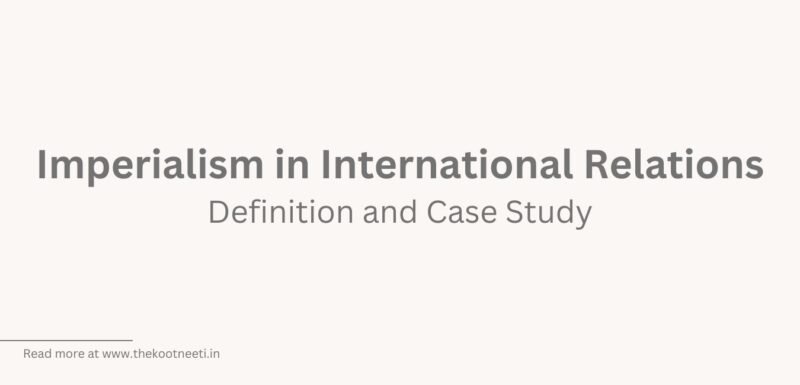Imperialism in International Relations: Definition and Case Study

Imperialism refers to the policy or practice of a country or group extending its control or influence over other countries or territories, often through military force or economic coercion. Imperialism has a long history and has taken many forms, including colonial empires, territorial expansion, and the establishment of protectorates or spheres of influence.
Imperialism has often been motivated by a desire for economic gain, strategic advantage, or ideological or cultural superiority. It has also been justified by some as a way to bring civilization or modernization to “uncivilized” or “underdeveloped” countries.
Imperialism has been controversial and has been criticized for its often negative impacts on colonized or controlled countries, including the exploitation of resources and labor, the suppression of local cultures and traditions, and the use of military force to maintain control. In the 20th century, the decolonization movement and the rejection of imperialism became key aspects of international relations and global politics.
Imperialist practices in International relations
There are several practices that can be considered imperialist in international relations, including:
- Colonization: This refers to the establishment of formal control over a territory or country by a foreign power, often through military conquest or the establishment of a colonial administration. Colonization often involves the exploitation of resources and labor, the suppression of local cultures and traditions, and the imposition of foreign policies and laws.
- Territorial expansion: This refers to the acquisition of new territories by a country, often through military conquest or the settlement of frontier areas. Territorial expansion can lead to the incorporation of new territories into a country or the establishment of protectorates or spheres of influence.
- Economic imperialism: This refers to the use of economic means, such as trade policies or investment, to extend the influence of a country or group over other countries or territories. Economic imperialism can involve the exploitation of resources or the establishment of economic dependencies.
- Cultural imperialism: This refers to the promotion or imposition of the culture, values, or ideology of one country or group on other countries or territories. Cultural imperialism can involve the suppression of local cultures and traditions, or the promotion of a particular ideology or worldview.
- Military intervention: This refers to the use of military force by a country or group to achieve political or strategic goals in other countries or territories. Military intervention can involve the deployment of troops, the use of air power, or the support of local forces.
Case Study – British Imperialism
British imperialism refers to the period of British colonial expansion and the maintenance of colonies by the British Empire. During the 19th and early 20th centuries, the British Empire was one of the largest and most influential empires in the world, with colonies and territories around the globe.
British imperialism had a number of causes, including economic, political, and cultural factors. Economic factors included the desire to access new markets and sources of raw materials, as well as the desire to secure strategic trade routes. Political factors included the desire to spread British influence and culture around the world, as well as to exert control over strategic areas. Cultural factors included the belief in British superiority and the desire to spread Christianity and Western values to other parts of the world.
British imperialism had a number of consequences, both positive and negative. On the positive side, it brought economic development and modernization to many parts of the world, and also facilitated the spread of ideas, values, and technology. However, it also had negative consequences, including the exploitation of natural resources and labor, the suppression of indigenous cultures and ways of life, and the use of violence and coercion to maintain control over colonies. The legacy of British imperialism continues to shape international relations and global politics to this day.


















